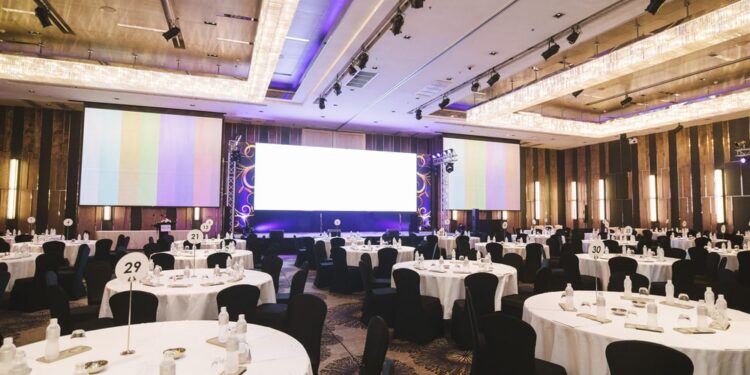In the bustling world of business, corporate events are elemental in fostering communication, collaboration, and fostering industry connections. As such, the selection of appropriate corporate meeting venues is vital to the success of these occasions. In this article, we will explore how companies can ensure they choose the ideal venues for their business events, considering a myriad of factors that contribute to a conducive and productive corporate setting.
Understanding the Fundamentals of a Corporate Meeting Venue
Before delving into the selection process, it is essential to understand what constitutes a corporate meeting venue. Corporate meeting venues are specialised spaces designed to accommodate business-related gatherings such as conferences, seminars, workshops, and board meetings. These venues equip businesses with the necessary amenities and environment to conduct professional activities efficiently.
The Importance of Location in Venue Selection
The location of corporate meeting venues plays a crucial role in determining the accessibility for attendees. It is important to choose a venue that is easily reachable via various modes of transport, and is in proximity to major business hubs or hotels if international or out-of-town delegates are expected. Convenience of access is a key factor in ensuring participants can arrive on time and without undue stress.
Size and Capacity: Matching Venue to Attendee Numbers
The size of the venue must be aligned with the number of attendees. A venue that is too small can lead to overcrowding and discomfort, while one that is too large may make the event seem poorly attended and impact the atmosphere. It is important to have a clear estimate of the guest list and choose a venue that provides an optimal fit.
Amenities and Technical Facilities: Ensuring a Smooth Event
Successful business events rely on more than just space. The chosen venue must be equipped with the latest technical facilities such as high-speed internet, audio-visual equipment, and conferencing tools. It is also crucial to have on-site technical support to address any issues that may arise during the event.
Aligning Venue Ambience with Corporate Brand Image
The venue’s ambience should align with the company’s brand image and the event’s purpose. A corporate gala will require a different setting than an industry conference. It’s also essential to assess the venue’s decor, lighting, and seating arrangements to ensure they complement the event’s tone.
Catering and Refreshment Options
Catering is an important aspect of any business event. The provision of quality food and beverages can enhance the overall experience for attendees. When selecting a venue, consider the catering services offered, including flexibility in menu options to accommodate dietary requirements.
Exemplary Service and Professional Staff
The service provided by the venue’s staff can make or break an event. Professional and attentive staff ensure that the event runs smoothly, and any guest queries or issues are addressed promptly. Before finalising a venue, consider visiting the site to observe the staff’s conduct and level of service.
Cost Considerations and Budget Alignment
Budget is a determining factor in the selection of a corporate meeting venue. It is important to have a clear understanding of the event budget and seek out venues that provide the best value for money. This includes reviewing comprehensive quotes that outline all potential costs to avoid unforeseen expenses.
Prioritising Flexibility and Contingency Options
A flexible venue can adapt to changing event requirements, such as last-minute changes in attendance numbers or room configuration. It’s wise to discuss these contingencies upfront to ensure the venue can accommodate such changes without significant disruptions or additional costs.
Assessing Past Event Successes
One way to gauge the suitability of a venue is to assess its track record with similar events. Reviews, case studies, or testimonials from previous clients can provide insight into how the venue handles corporate events and whether past clients had successful experiences.
Security and Privacy: Non-negotiable Factors
Corporate events often involve the handling of sensitive information, making security and privacy key concerns. The selected venue should have robust security measures in place to protect attendees and intellectual property. Additionally, consider private spaces away from public areas to ensure confidentiality is maintained during meetings.
Reputation and Reliability of the Venue Provider
The reputation of the venue provider can significantly impact the success of an event. Opt for providers who are known for their reliability and professionalism in managing corporate events, as they are more likely to deliver a seamless experience.
Accessibility for All Participants
It is crucial that the chosen venue is accessible to all participants, including those with disabilities. This includes access ramps, lifts, and facilities that are compliant with disability regulations, ensuring inclusivity for all attendees.
Parking and Transportation Services
Convenient parking facilities and transportation options are amenities that should not be overlooked when selecting a venue. Adequate parking for attendees who choose to drive, or partnerships with local transport services, can greatly add to the convenience of your event.
Final Thoughts
In summary, choosing an appropriate venue is a complex task that requires careful consideration of a variety of factors. A well-chosen venue not only reflects positively on the company’s image but also enhances the experience of the attendees and contributes to the overall success of the event.
. It is essential for organisers to thoroughly research and visit potential corporate meeting venues, keeping in mind the factors mentioned above before making a decision.
By taking the time to select the ideal venue, a company can maximise the chances of hosting successful business events that achieve their objectives and leave lasting, positive impressions on all those involved.












